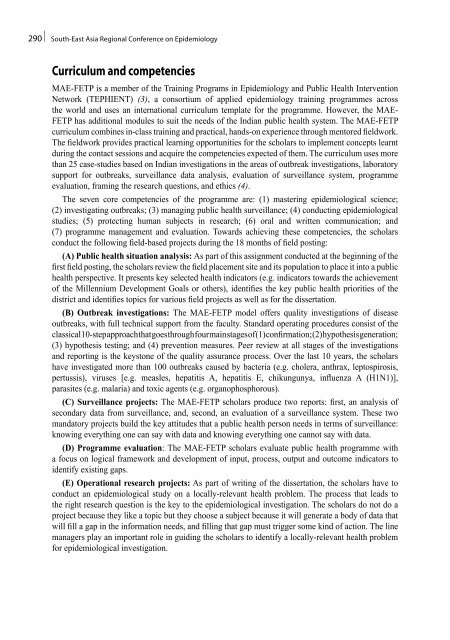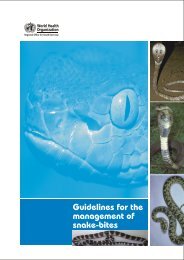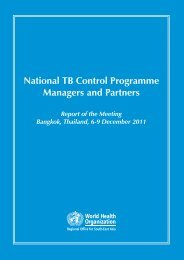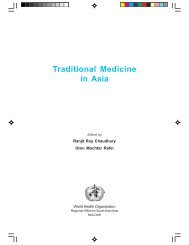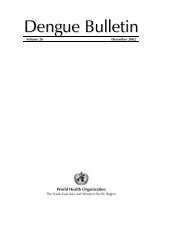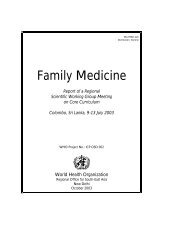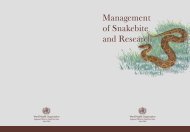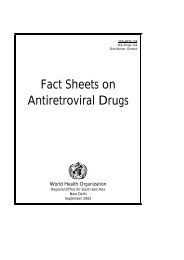South-East Asia Regional Conference on Epidemiology
South-East Asia Regional Conference on Epidemiology
South-East Asia Regional Conference on Epidemiology
Create successful ePaper yourself
Turn your PDF publications into a flip-book with our unique Google optimized e-Paper software.
290 | <str<strong>on</strong>g>South</str<strong>on</strong>g>-<str<strong>on</strong>g>East</str<strong>on</strong>g> <str<strong>on</strong>g>Asia</str<strong>on</strong>g> <str<strong>on</strong>g>Regi<strong>on</strong>al</str<strong>on</strong>g> <str<strong>on</strong>g>C<strong>on</strong>ference</str<strong>on</strong>g> <strong>on</strong> <strong>Epidemiology</strong><br />
Curriculum and competencies<br />
MAE-FETP is a member of the Training Programs in <strong>Epidemiology</strong> and Public Health Interventi<strong>on</strong><br />
Network (TEPHIENT) (3), a c<strong>on</strong>sortium of applied epidemiology training programmes across<br />
the world and uses an internati<strong>on</strong>al curriculum template for the programme. However, the MAE-<br />
FETP has additi<strong>on</strong>al modules to suit the needs of the Indian public health system. The MAE-FETP<br />
curriculum combines in-class training and practical, hands-<strong>on</strong> experience through mentored fieldwork.<br />
The fieldwork provides practical learning opportunities for the scholars to implement c<strong>on</strong>cepts learnt<br />
during the c<strong>on</strong>tact sessi<strong>on</strong>s and acquire the competencies expected of them. The curriculum uses more<br />
than 25 case-studies based <strong>on</strong> Indian investigati<strong>on</strong>s in the areas of outbreak investigati<strong>on</strong>s, laboratory<br />
support for outbreaks, surveillance data analysis, evaluati<strong>on</strong> of surveillance system, programme<br />
evaluati<strong>on</strong>, framing the research questi<strong>on</strong>s, and ethics (4).<br />
The seven core competencies of the programme are: (1) mastering epidemiological science;<br />
(2) investigating outbreaks; (3) managing public health surveillance; (4) c<strong>on</strong>ducting epidemiological<br />
studies; (5) protecting human subjects in research; (6) oral and written communicati<strong>on</strong>; and<br />
(7) programme management and evaluati<strong>on</strong>. Towards achieving these competencies, the scholars<br />
c<strong>on</strong>duct the following field-based projects during the 18 m<strong>on</strong>ths of field posting:<br />
(A) Public health situati<strong>on</strong> analysis: As part of this assignment c<strong>on</strong>ducted at the beginning of the<br />
first field posting, the scholars review the field placement site and its populati<strong>on</strong> to place it into a public<br />
health perspective. It presents key selected health indicators (e.g. indicators towards the achievement<br />
of the Millennium Development Goals or others), identifies the key public health priorities of the<br />
district and identifies topics for various field projects as well as for the dissertati<strong>on</strong>.<br />
(B) Outbreak investigati<strong>on</strong>s: The MAE-FETP model offers quality investigati<strong>on</strong>s of disease<br />
outbreaks, with full technical support from the faculty. Standard operating procedures c<strong>on</strong>sist of the<br />
classical 10-step approach that goes through four main stages of (1) c<strong>on</strong>firmati<strong>on</strong>; (2) hypothesis generati<strong>on</strong>;<br />
(3) hypothesis testing; and (4) preventi<strong>on</strong> measures. Peer review at all stages of the investigati<strong>on</strong>s<br />
and reporting is the keyst<strong>on</strong>e of the quality assurance process. Over the last 10 years, the scholars<br />
have investigated more than 100 outbreaks caused by bacteria (e.g. cholera, anthrax, leptospirosis,<br />
pertussis), viruses [e.g. measles, hepatitis A, hepatitis E, chikungunya, influenza A (H1N1)],<br />
parasites (e.g. malaria) and toxic agents (e.g. organophosphorous).<br />
(C) Surveillance projects: The MAE-FETP scholars produce two reports: first, an analysis of<br />
sec<strong>on</strong>dary data from surveillance, and, sec<strong>on</strong>d, an evaluati<strong>on</strong> of a surveillance system. These two<br />
mandatory projects build the key attitudes that a public health pers<strong>on</strong> needs in terms of surveillance:<br />
knowing everything <strong>on</strong>e can say with data and knowing everything <strong>on</strong>e cannot say with data.<br />
(D) Programme evaluati<strong>on</strong>: The MAE-FETP scholars evaluate public health programme with<br />
a focus <strong>on</strong> logical framework and development of input, process, output and outcome indicators to<br />
identify existing gaps.<br />
(E) Operati<strong>on</strong>al research projects: As part of writing of the dissertati<strong>on</strong>, the scholars have to<br />
c<strong>on</strong>duct an epidemiological study <strong>on</strong> a locally-relevant health problem. The process that leads to<br />
the right research questi<strong>on</strong> is the key to the epidemiological investigati<strong>on</strong>. The scholars do not do a<br />
project because they like a topic but they choose a subject because it will generate a body of data that<br />
will fill a gap in the informati<strong>on</strong> needs, and filling that gap must trigger some kind of acti<strong>on</strong>. The line<br />
managers play an important role in guiding the scholars to identify a locally-relevant health problem<br />
for epidemiological investigati<strong>on</strong>.


